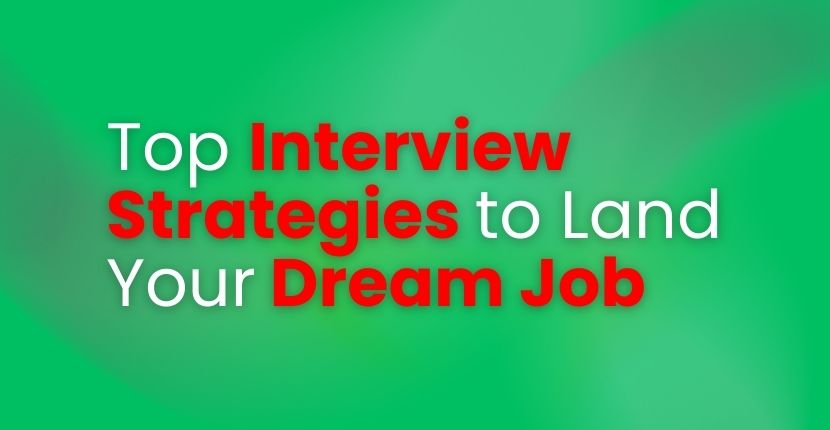Top Interview Strategies to Land Your Dream Job
Introduction
Job interviews can be stressful, but they’re also your best opportunity to shine and prove you’re the right fit for the role. While resumes and applications get you in the door, interviews are where hiring decisions are made. The good news? With the right preparation and strategies, you can stand out from the competition and confidently take one step closer to your dream career.
In this comprehensive guide, we’ll walk through the top interview strategies to land your dream job—covering everything from company research and answering tricky questions to body language, follow-ups, and more.
1. Research the Company and Role Thoroughly
Preparation begins long before the interview. Employers can easily spot candidates who haven’t done their homework. To make the best impression:
- Study the company’s website: Learn about their mission, products, and culture.
- Check recent news: Use LinkedIn, Google News, or press releases to understand their latest achievements.
- Understand the job description: Identify the skills and responsibilities they value most.
- Research competitors: This gives you industry context and helps you ask smarter questions.
💡 Pro Tip: Take notes on key facts and weave them naturally into your answers. For example: “I was impressed by your company’s new digital initiative. I’d love to contribute to its continued success.”
2. Craft and Practice Your Elevator Pitch
Interviews often start with “Tell me about yourself.” This is your chance to grab attention and set the tone. An elevator pitch should be:
- Brief (30–60 seconds)
- Focused on value (skills + achievements + career goal)
- Tailored to the role
Example:
“I’m a software engineer with three years of experience developing mobile applications. My focus has been on improving user experience and increasing app efficiency. I’m excited about this opportunity because your company values innovation and user-first design, which align with my strengths.”
Practicing this out loud boosts confidence and ensures you sound polished rather than rehearsed.
3. Master Common Interview Questions
Preparation for common questions prevents awkward pauses and builds confidence. Some frequent ones include:
- Tell me about yourself.
- What are your strengths and weaknesses?
- Why should we hire you?
- Describe a challenge and how you overcame it.
Answer these with the STAR method (Situation, Task, Action, Result):
- Situation: Set the context.
- Task: Describe the responsibility.
- Action: Explain what you did.
- Result: Share the outcome.
Example:
“In my last role, our team faced a tight deadline for a product launch. I took the lead on reorganizing tasks, which increased efficiency. As a result, we delivered the project two days early and boosted client satisfaction.”
4. Showcase Your Soft Skills
Employers hire for both skills and personality. While technical abilities matter, soft skills often determine whether you’re a cultural fit. Highlight:
- Communication: Clear, confident, and professional.
- Teamwork: Willingness to collaborate with others.
- Adaptability: Ability to handle change and challenges.
- Problem-Solving: Creative approaches to tough situations.
Don’t just claim these skills—use examples to prove them.
5. Pay Attention to Body Language
First impressions are heavily influenced by nonverbal cues. Positive body language includes:
- A firm (but not crushing) handshake.
- Good posture, sitting upright but relaxed.
- Steady eye contact without staring.
- Smiling naturally to show confidence and approachability.
Avoid crossing your arms, tapping nervously, or constantly checking notes.
💡 Pro Tip: Practice with a friend or record yourself to identify areas of improvement.
6. Ask Smart Questions at the End
When interviewers ask, “Do you have any questions for us?”—never say “No.” Asking questions shows genuine interest and curiosity. Consider asking:
- “How does this role contribute to the company’s long-term goals?”
- “What qualities do your most successful employees share?”
- “What opportunities for growth and learning does the company offer?”
Avoid salary or vacation questions at this stage unless the employer brings them up first.
7. Dress for Success
The way you dress signals professionalism. While dress codes vary, always aim to look neat and confident:
- Corporate roles: Business suits or formal wear.
- Creative fields: Business casual with a polished touch.
- Virtual interviews: Dress fully—yes, even your pants! Dressing well impacts mindset.
8. Handle Stress and Nervousness Calmly
It’s normal to feel nervous, but don’t let it overwhelm you. To calm nerves:
- Practice deep breathing before entering.
- Prepare thoroughly—it boosts confidence.
- Visualize success to shift the mindset from fear to excitement.
- Pause briefly before answering questions if needed.
Employers respect candidates who stay composed under pressure.
9. Follow Up Professionally After the Interview
Your job isn’t done once you leave the room. Sending a thank-you email within 24 hours is a small but powerful gesture. Include:
- Gratitude for their time.
- A reminder of your enthusiasm for the role.
- A quick reference to something you discussed.
Example:
“Thank you for the opportunity to interview yesterday. I enjoyed learning more about your upcoming projects and would be excited to contribute my skills in digital marketing to support them. I look forward to the possibility of joining your team.”
This step demonstrates professionalism and keeps you top of mind.
10. Learn From Every Interview Experience
Even if you don’t land the job, treat every interview as a learning opportunity. Reflect on:
- Which answers went well?
- Where you struggled or hesitated.
- Feedback from the interviewer (if shared).
Improvement over time is the secret weapon to eventual success.
Conclusion
Interviews don’t have to be intimidating. With preparation, practice, and professionalism, you can turn them into powerful opportunities to highlight your value. From researching the company to mastering body language and following up, these top interview strategies to land your dream job will help you stand out and move closer to career success.
👉 Ready to take the next step? Explore the Latest Job Listings on Jobz Pro and find opportunities that match your skills today!


